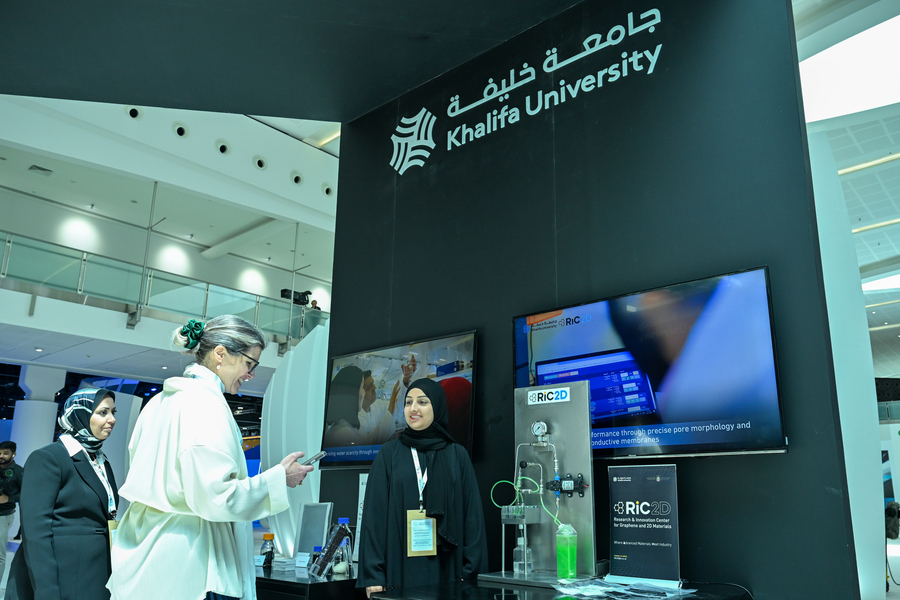Interns Gain Knowledge in New Technology Systems for Implementation in Abu Dhabi
Abu Dhabi-UAE: 29 August, 2012 – Two students from Masdar Institute of Science and Technology preferred to do their internship at the Kobe facility of Mitsubishi Heavy Industries (MHI), a global leader in the design and supply of energy, aerospace, machinery, transportation, as well as environmental systems and equipment.
Their objective was to assess the new intelligent transportation technologies that could be implemented in Abu Dhabi.
During their internship in Japan, they focused on ‘Simulation of the electrification of transportation in Abu Dhabi’ and the ‘Clean mobility simulator’ – areas that concur with Abu Dhabi’s long-term plans on intelligent transportation through the use of clean energy. The two students – Reem Al Junaibi and Mohamed Al Hadhrami – were part of a group of five UAE national graduates selected from the Foundation program and First Year M.Sc. for summer internship at four Japanese corporations.
Working in the transportation systems and advanced technology division at Mitsubishi Heavy Industries has helped Al Junaibi gain a comprehensive understanding of the various technologies that have the potential to reduce carbon footprint. She gained adequate exposure to some of the most advanced and efficient technologies covering railways, trains, traffic control systems, intelligent transportation systems, and other types of research-related traffic simulators.
A student in Engineering Systems Management, Al Junaibi was trained on how to use the various functionalities in the clean mobility simulator, which is an important part of her thesis. She says: “The clean mobility is the tool I will use to calculate the charging requirements of various hypothetical scenarios in the introduction of electric vehicles in Abu Dhabi. The results of the simulator will be further studied to understand the potential and challenges in charging these vehicles on Abu Dhabi’s electric grid.”
Al Junaibi’s internship and research have become even more relevant in Abu Dhabi, where the government recently installed the Middle East’s first rapid charging station that can reduce the time taken to recharge electric cars by over 90%. Additionally, Masdar City, where Masdar Institute is located, and Mitsubishi Heavy Industries are testing the feasibility of EV technology as a point-to-point transportation solution, and in particular, testing and validating the performance of EVs and various charging solutions given the region’s climate and usage patterns.
At the same time, Mohamed Al Hadhrami, another Engineering Systems and Management student, also interned at the Kobe facility on ‘simulation of the electrification of transportation in Abu Dhabi’.
Al Hadhrami’s internship was closely related to his thesis at Masdar Institute – ‘Feasibility assessment of low-carbon vehicles in Abu Dhabi’. He says: “I focused on studying the effects of the simulation of the dedicated EV-lane. However, we got a chance to learn about MHI’s various products related to the field and visited some factories too.”
Mitsubishi Heavy Industries sent the two students to various facilities including the Mihara factory in Hiroshima, the Yokohama factory, and the shipyard in Kobe. These site visits were related to transportation and power systems, where advanced technologies were highlighted. The students also gained an insight on the supply chain management of each factory.
Moreover, a number of workshops were organized in conjunction with Yokohama National University, Tokyo University, Centralized Traffic Control (CTC), Interaction Technology Laboratory (ITL), which is dedicated to the development of innovative systems and artefacts related to the field of Human-Computer Interaction (HCI). The events further helped expand the students understanding of intelligent transportation.
One of the key elements that amazed the students during the internship was the office culture, which brings out the dedication, persistence, and competitiveness among the Japanese workforce. Al Junaibi says: “I believe these factors remain the cornerstone of Japan’s economic success. The whole system is perfectly aligned and integrated, leading to an efficient and well established business processes.”
For Al Hadhrami, in addition to simulation, the two-month internship helped him learn about the Japanese way of work. He says: “In Japan, work comes first and they are highly dedicated to what they are doing. I also noticed that meetings form an important aspect of the Japanese work culture and there are some wonderful lessons to be learnt.”
Technology apart, both students learnt about the process of development of technologies and bringing technologies from R&D to the mass market. They were also inspired by the attention to detail, precision engineering and the quality of technology that comes from the design stages to assembly lines.
Established as an on-going collaboration with the Massachusetts Institute of Technology (MIT), Masdar Institute integrates theory and practice to incubate a culture of innovation and entrepreneurship, working to develop the critical thinkers and leaders of tomorrow. With its world-class faculty and top-tier students, the Institute is committed to finding solutions to the challenges of clean energy and climate change through education and research.






